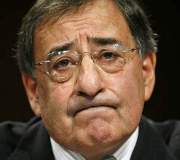
Hu and Singh, stable relations
India, no 'linchpin' in US strategy against China
by Shastri Ramachandaran via sadh - Global Times Wednesday, Jun 13 2012, 1:41am
international /
peace/war /
other press
India eschews linchpin role in US strategy to 'rebalance' Asia
In January, when the Obama administration came out with its ambition of a military "pivot" to Asia, it caused confusion and unease in the region. Earlier this month, speaking at the Shangri-La Dialogue in Singapore, which was attended by most Asian defense ministers, US Defense Secretary Leon Panetta eschewed the term "pivot" and referred to a "rebalancing" toward Asia.

Hu and Singh, stable relations
That cleared the confusion, but added anxiety to the unease when Panetta unveiled a US plan to boost its military presence in Asia with 60 percent of the US warships to be deployed in the Pacific.
Although Panetta said that the renewed US interest in the Asia-Pacific region was not aimed at China, "few in the audience said they believed it," according to a recent report in the New York Times.
The stepped-up military emphasis, the Times report observed, "appears intended to force a confrontation with China, a situation feared by many countries in the region, all of which enjoy strong trade ties with China."
Panetta, who was scheduled to visit India three days later on June 5, said his visit to New Delhi would focus on "building a strong security relationship with the country I believe will play a decisive role in shaping the security and prosperity of the 21st century."
Asian capitals, particularly Beijing and New Delhi, and Washington were agog with speculation that, at last, India would be forced to show its hand. Many expected India to proclaim itself a strategic ally of the US. Others felt that India would make it plain that there is no basis for a strategic alliance regardless of the all-round, including defense, cooperation with the US.
Although China was not alone in being wary about the US boosting its military presence in Asia, it had reasons to be irritated with Panetta stirring up feeling against China during his eight-day tour of Asia.
US Secretary of State Hillary Clinton did the same in 2010, when she landed in Hanoi and, more recently, when she visited Myanmar.
India is very much interested in US military technology and, therefore, keen to upscale defense cooperation. Therefore, when India did not come out cheering the new US Asia strategy and Panetta's pitch in Singapore, it was assumed that India's restraint was to avoid raising China's hackles.
But when Panetta spoke in Delhi, that assumption was proved wrong. Worse for Washington was New Delhi pointedly, but politely, asserting its strategic autonomy and aversion to being taken for granted as a US ally.
For this, the US has itself and Panetta's overblown rhetoric to blame. By describing India as the "linchpin" in the US strategy of "rebalancing" toward Asia-Pacific, Panetta forced his hosts to clarify that India could never be locked in as an integral part of someone else's strategy.
At that time, with the third India-US Strategic Dialogue set to begin a week later, Washington expected India to not only march in step, but also bask in the glory of being appreciated for it.
As Panetta said in New Delhi on June 6 "America is at a turning point. After a decade of war, we are developing a new defense strategy - a central feature of which is 'rebalancing' toward the Asia-Pacific region. [...] Cooperation with India is a linchpin in this strategy."
The same day, on the sidelines of the Shanghai Cooperation Organization summit, Chinese Vice Premier Li Keqiang assured the India's External Affairs Minister S.M. Krishna of working together to maintain strategic communication, improve mutual political trust and appropriately address disputes and safeguard the peace and tranquillity in border areas to advance bilateral relationship to a new phase.
Krishna's fulsome reciprocation underscored Sino-Indian relations as "one of the most important bilateral relationships in the world."
The Indian media's focus on both the US and China wooing India with such fervor could not have been flattering to Washington and Panetta's high-power delegation.
Besides, Li and Krishna putting Panetta in the shade, both Indian Prime Minister Manmohan Singh and Defence Minister A.K. Antony conveyed their reservations on the "rebalancing" strategy to the visiting US defense secretary.
In fact, reports are that Manmohan Singh sent a firm and unmistakable message to the US that Washington needs to recalibrate its new defense strategy.
Antony, too, impressed on Panetta that the US needed to recalibrate or rethink its defense policy. He underscored the need "to strengthen the multilateral security architecture" in the Asia Pacific and that it must "move at a pace comfortable to all countries concerned."
With everything spelled out in no uncertain terms, Washington should go into this latest meeting after shedding any illusions it still harbors of India being a linchpin in the US strategy to further militarize the Indian Ocean region. China has every reason to be pleased at the outcome, for now.
© 2012 by The Global Times
[Panetta is emerging as one of America's truly inept, bumbling buffoons in the Rumsfeld-Bush tradition. With an idiot like Panetta in high office Russia and China can relax to a degree. Panetta is scoring so many own goals it's laughable!]

Leon Panetta, US Defense Secretary and idiot!
http://www.globaltimes.cn/content/714490.shtml